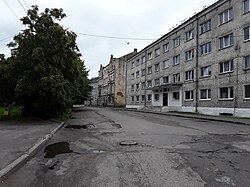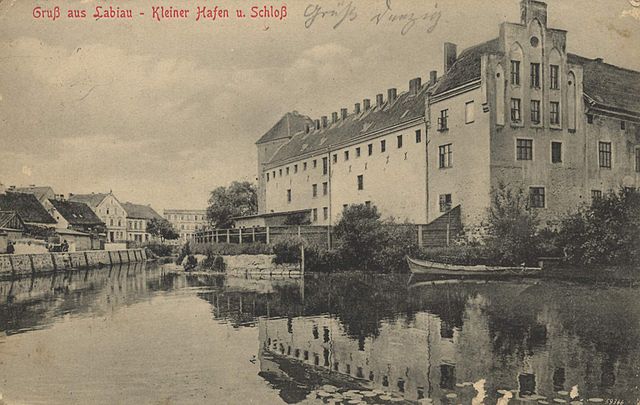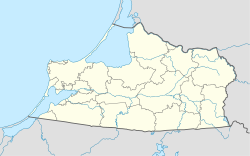Polessk
Town in Kaliningrad Oblast, Russia From Wikipedia, the free encyclopedia
Polessk (Russian: Полесск; German: Labiau; Lithuanian: Labguva; Polish: Labiawa) is a town and the administrative center of Polessky District in Kaliningrad Oblast, Russia, located 49 kilometers (30 mi) northeast of Kaliningrad, the administrative center of the oblast, at the junction of a main road and a railroad at the Deyma River, shortly before it enters the Curonian Lagoon. Population figures: 7,581 (2010 Census);[3] 7,681 (2002 Census);[7] 6,859 (1989 Soviet census);[8] 4,744 (1885).
Polessk
Полесск | |
|---|---|
 | |
| Coordinates: 54°52′N 21°06′E | |
| Country | Russia |
| Federal subject | Kaliningrad Oblast[1] |
| Administrative district | Polessky District[1] |
| Town of district significance | Polessk[1] |
| Founded | 13th century[2] |
| Elevation | 3 m (10 ft) |
| Population | |
• Total | 7,581 |
| • Capital of | Polessky District,[1] town of district significance of Polessk[1] |
| • Municipal district | Polessky Municipal District[4] |
| • Urban settlement | Polesskoye Urban Settlement[4] |
| • Capital of | Polessky Municipal District,[4] Polesskoye Urban Settlement[4] |
| Time zone | UTC+2 (MSK–1 |
| Postal code(s)[6] | 238630 |
| OKTMO ID | 27718000001 |
Geography
The Polessk Canal begins in the town.
History
Summarize


It was founded in the 13th century,[2] by the Teutonic Order who erected a castle there and named it Labiau. Initially it was part of the State of the Teutonic Order. In 1454, King Casimir IV Jagiellon incorporated the region to the Kingdom of Poland upon the request of the anti-Teutonic Prussian Confederation.[9] After the subsequent Thirteen Years' War (1454–1466) the settlement became a part of Poland as a fief held by the Teutonic Knights[10] until 1525 and by Ducal Prussia afterwards. In this town, on November 20, 1656, was signed the Treaty of Labiau. From the 18th century, it was part of the Kingdom of Prussia, and from 1871 it was also part of Germany, within which it was administratively located in the province of East Prussia. Labiau was a district seat in the administrative region of Königsberg. In 1885, Labiau had 4,744 inhabitants, almost all of whom were Lutherans.
Labiau was overrun by the Soviet Red Army in 1945 near the end of World War II. After Germany's defeat in the war in 1945, the town was transferred to Soviet Russia and the following year it was renamed Polessk.[2] The German inhabitants were partly evacuated via the coast, or were subsequently expelled in accordance with the Potsdam Agreement and replaced with Soviet citizens.
The former Polessk (air base) is nearby.[11]
Administrative and municipal status
Within the framework of administrative divisions, Polessk serves as the administrative center of Polessky District.[1] As an administrative division, it is, together with two rural localities, incorporated within Polessky District as the town of district significance of Polessk.[1] As a municipal division, the town of district significance of Polessk is incorporated within Polessky Municipal District as Polesskoye Urban Settlement.[4]
Notable people
- Otto Brakat (1916–1978) Wehrmacht soldier
- Hans von Lehwaldt (1685-1768), Prussian field marshal
References
Wikiwand in your browser!
Seamless Wikipedia browsing. On steroids.
Every time you click a link to Wikipedia, Wiktionary or Wikiquote in your browser's search results, it will show the modern Wikiwand interface.
Wikiwand extension is a five stars, simple, with minimum permission required to keep your browsing private, safe and transparent.





